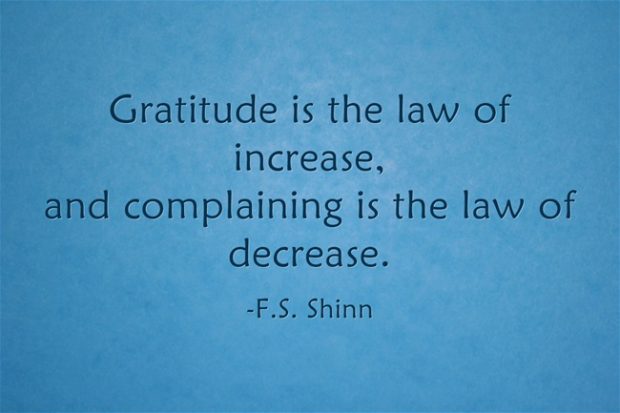The Shocking Consequences of Complaining: Grumbling Could Be Killing You
 It’s something we all do, hundreds of times a day – averaging about once every minute. Complain. Whether it’s about the traffic, the weather, or our job, complaining is hard to avoid. But this habit can become the negative soundtrack of our lives.
It’s something we all do, hundreds of times a day – averaging about once every minute. Complain. Whether it’s about the traffic, the weather, or our job, complaining is hard to avoid. But this habit can become the negative soundtrack of our lives.
Why do we do it? It feels good to vent, doesn’t it? Complaining also seems like a good way to connect; when we get together and moan about a common dislike, it can create a bonding experience. Complaining should make us feel better, right? Well, scientific tells us otherwise. Instead of simply letting off steam, griping makes us angrier and puts our health, relationships and careers at risk.
Complaining is Harmful to Your Health
When we complain, we release the stress hormone cortisol. When cortisol levels rise, our immune system is compromised, blood pressure goes up, we gain weight and there is an increased risk of heart disease. It can also harm parts of the brain used for problem solving and other cognitive functions. (This also happens when we listen to someone else moan and groan).
You can Rewire Your Brain towards Positivity
Thankfully, we can change this habit. Recent advances in brain research indicate that our brains are constantly being reorganized throughout our lives, changing with every thought. The more we use certain pathways, the stronger they get and the easier it is for the brain to travel along these data highways. In other words, having a thought makes it easier to have that thought again. The things we think about repeatedly shape our personality; we become what we think about most. Cut down on complaining and your brain will physically change so that you are less often triggering pessimism, fear, and other negative mental states.
Strategies to Cut the Complaining Habit
- Track how often you complain. Awareness is the first step towards change.
- If you catch yourself whining, add the word ‘but’ and find something positive about the situation. For example, “There is so much traffic, but I’m grateful I’m driving a comfortable car and listening to my favorite tunes”.
- If you notice you are saying “I have to…” or “I should…” change it to “I get to…” You’ll feel more empowered and positive.
- Complaining without moving towards a solution can make us feel victimized and powerless. Make a direct request for action to resolve the problem. For example, “Its cold in here, so could you please turn up the heat”.
- Journal about what’s bothering you so you can gain a better understanding and come up with possible solutions.
- Instead of complaining about a bad experience, ask what the lesson is and use it as an opportunity to grow.
- Spend more time with people who uplift you and less time with chronic complainers – because complaining is contagious.
Change doesn’t happen overnight, but the less you complain, the more you’ll find to appreciate and be grateful for – and the happier and more peaceful you will feel.

I love this! Thanks Hellen. We need reminders not to feed into the negativity around us. I notice this often happens in the workplace. I like your tips, especially about traffic, but listening to our favorite music in a comfortable car makes it enjoyable!….we all have thinks to be grateful for. Sometimes we forget.
Hi Hellen, As usual, your insights are amazing! Recently, I experienced something odd while waiting for a bus around where I work (at a University): There was another woman waiting in line for the bus, also; previously, we had chatted for a bit. This time when she saw me, she told me that my being ‘so happy’ really irritated her. (!!!!). If I remember correctly, I changed the subject. But I thought about it later and it occurred to me that I know a LOT of people who are very negative in their attitudes with just about everything. I was raised by parents who were positive and I always felt that was why they overcame so many health issues, etc. They would get excited just looking up at the sky and seeing an especially fluffy cloud; they kept their child-like view of everything around them. Thanks for reminding us ….to be grateful! We’ll live longer!
Hi Adele,
Thanks for sharing your experience. You would think that you being happy would rub off on her. Oh well, her loss – we are all on different paths anyway. How wonderful that your parents passed along such a beautiful gift to you, an attitude of gratitude. Long live the happy people 🙂
Thank you Hellen!
This is something I need to put in practice. I had the opposite experience growing up with my parents that Adele did. They were always so negative, even though, looking back, we had so much to be thankful for. Thanks for something for me to think about!
Happiness is a balance, recognizing on this planet of duality things are never 100% one way or the other, and … that’s OK, because that’s part of what we’re here to do, to fix things. To the lady who was irritated by someone’s else’s bubbliness, that’s her stress talking, the conflict between what that lady would like to have, and the reminder she’s not there. Were I the target of happiness-criticism, I would invite her to come along my journey, that I needed another friend on that journey. I would open a line of conversation that said “I know all is not well, can you tell me about it… (or) and I should have noticed it in you, and not been so self-centered in my happiness, that the ability to be happy is something to be shared, and you’re not there yet, and perhaps I can help, because I sure would like to have you along.” Otherwise it’s just another form of “me-me-me-not-you”. 🙂